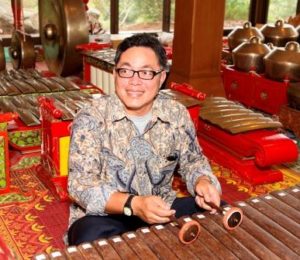
Imagine a country with a population ten times the size of Australia’s and the largest economy in South East Asia.
It’s a democracy, its economic growth is second only to China, and several of its key political players are Australian university graduates, with others rising to prominence.
Now imagine that those graduates and some of their Cabinet colleagues are considering South Australia as the location for one of its most important international hubs.
It’s against this background that a Flinders University symposium attended by senior Australian and Indonesian Government representatives and academics will discuss ‘Indonesia and Australia: Power of Education and Soft Diplomacy’ on Monday.
The country, of course, is Indonesia – and a significant proportion of those graduates studied at Flinders University.
Dr Priyambudi Sulistiyanto, an Indonesian who also studied at Flinders, is Director of the Flinders Asia Centre.
He has spent the past 20 years in Australia teaching Indonesian and building relationships between Australian and Indonesian students, as well as within the wider community.
Surrounded by a traditional ‘gamelan’ of Indonesian musical instruments in Flinders University’s beautifully coloured Javanese Pendopo building, with traditional music playing softly in the background, Dr Sulistiyanto speaks quietly and eloquently about the unique opportunity. But while his tone is gentle, his message is powerful.
“Indonesia is Australia’s closest neighbour and the relationship between the two countries is already very strong, but I believe we are on the verge of a once-in-a-lifetime opportunity to take that relationship to the next level,” Dr Sulistiyanto said.
“This is because a significant proportion of the current generation of senior politicians in Indonesia studied in Australia and created very positive memories and relationships here.
“Several members of the current Cabinet studied in Australia, which is part of the reason why South Australia is seen as a good place from which to engage with the rest of country.
“Because of this unique combination of factors, this is a rare moment during which Australia and Indonesia can reach out to each other in a way that has not been possible before.”
The Flinders symposium follows INDOfest 2014, the annual Indonesian cultural celebration that is expected to attract as many as 30,000 people to its free family day event at Rymill Park this Sunday.
Guests at Rymill Park will include Government ministers, business and community leaders, and dignitaries including the Governor of South Australia Rear Admiral Kevin Scarce.
But while the eyes of the general public will be on the more colourful activities of INDOfest, Dr Sulistiyanto is firmly focussed on the symposium.
Alongside his fellow Indonesian teachers, he has taken his unofficial role as a ‘cultural ambassador’ extremely seriously and wants to see something built upon the foundations he and his colleagues have spent years laying.
The foundations analogy is appropriate because the hub that Dr Sulistiyanto wants to see established at Flinders is being called an ‘Indonesian House’.
The House would be a place where key players in the Indonesian and Australian government, education and business sectors can come together and work for the mutual benefit of both countries.
It is an ambitious idea that is enthusiastically supported and driven by Flinders Vice-Chancellor Michael Barber, Pro Vice-Chancellor (International) Nancy Cromar and International Office Acting Associate Director Matt Taverner – who is a former Indonesian language student at Flinders.
The significance of the opportunity is reflected in the list of Symposium guests and speakers, which includes Federal Minister for Education Christopher Pyne, Indonesian Education and Cultural Attaché to Australia Professor Ronny Rachman Noor, Rector of the University of Gadjah Mada Professor Dr Pratikno, and Australian Department of Foreign Affairs Director Elly Lawson.
On Monday the symposium will spend three and a half hours discussing the power of education and soft diplomacy, examining opportunities for collaboration and cooperation between Indonesia and Australia.
Afterwards, they will retire to Flinders’ beautiful Pendopo, a place where through weekly open music sessions, cross-cultural discussions and displays of mutual respect and appreciation, many firm friendships have been established.
It is Dr Sulistiyanto’s hope that on Monday it will become the place where opportunities are taken and new relationships are forged that will have significant long-term benefits for Australia and Indonesia.

